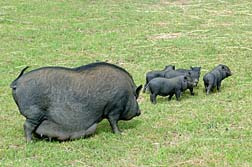In so doing, Americans are losing their faith in government watchdogs like the US Food and Drug Administration (FDA), and their ability or lack thereof to keep the nation's drug supply safe.
 As Americans dealt with the news of yet another drug recall—this time virtually all of Baxter International's heparin blood thinner products, a new wrinkle has been added to the story.
As Americans dealt with the news of yet another drug recall—this time virtually all of Baxter International's heparin blood thinner products, a new wrinkle has been added to the story.A very serious wrinkle.
Earlier in the week it was revealed that a new, and complex test used in the testing of heparin has revealed the presence of a counterfeit ingredient. Although magnetic resonance imaging failed to determine what the counterfeit ingredient was, it was nonetheless found that as much as 20 per cent of the heparin's active ingredient was an unknown substance blended with genuine heparin.
The counterfeit ingredient, whatever it turns out to be, is designed to mimic the real thing.
However, it cannot be determined what effect the counterfeit ingredient would have on the human body. Until the substance is identified, the fact remains that patients have been injected with heparin containing up to 20 per cent of raw heparin comprised of some unknown substance.
So far there have been 19 deaths, and up to 785 adverse reaction reports linked to tainted heparin. While 46 deaths have been reported to the FDA, it is believed that 19 appeared to stem from the suspect heparin. Just this week the German health authority expressed concern after patients in Germany were becoming ill.
While the investigation is still in the preliminary stage, it has been reported that the heparin found to contain the counterfeit ingredient has been linked to allergic reactions and / or deaths, while heparin found to be free from the unknown contaminant is associated with patients who have not had adverse incidents.
One can only speculate why such spiking of genuine heparin is happening. An outbreak of blue ear pig disease throughout many provinces in China last year severely impacted swine stocks. Heparin is derived from the intestines of pigs. The counterfeit could have been added in an effort to bolster an anemic supply of raw heparin.
Or, the counterfeiting could have been initiated out of sheer greed.
Whatever the cause or the reason, the fact remains that the counterfeit ingredient was found in heparin sourced from China.
It serves as a stark reminder of the tainted toothpaste scandal last year, in which diethylene glycol, an ingredient of anti-freeze, showed up in a million tubes of toothpaste as a mimic for the much more expensive pharmaceutical glycerin. Diethylene glycol can lead to liver disease and kidney damage. The toothpaste wound up in hospitals, discount stores and luxury hotels. Three executives with two American companies were hit with criminal charges two days ago. Vernon Sales Inc. and Selective Imports Corporation, both based in Los Angeles, were cited.
Not to be forgotten is the tainted pet food scandal of last year, which devastated Menu Foods but more importantly sickened and killed thousands of pets, after food was processed using raw material sourced from China that contained toxic melamine used to manufacture plastics. The melamine was added to make it appear higher in protein.
In Panama, at least 174 people were poisoned and 115 died after a counterfeit ingredient turned up in cold medicine made by an unlicensed plant in China.
READ MORE LEGAL NEWS
Meanwhile, the FDA is under-funded and without the resources to inspect foreign-based plants. By its own admission, it failed to inspect the American-owned plant in China before the facility began supplying processed heparin to Baxter International in 2004.
A number of independent assessments have concluded that the FDA is no longer able to carry out its current responsibility, at a time when more and more drugs are being manufactured, or materials sourced from foreign countries, and especially China.
The Bush Administration has proposed a budget increase of just three per cent to the FDA—insufficient to even keep up with expenses, let alone expand the agency.
